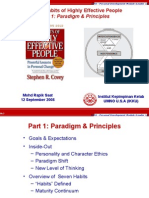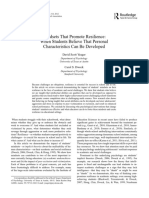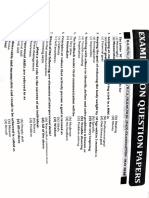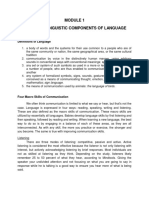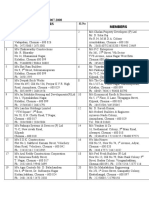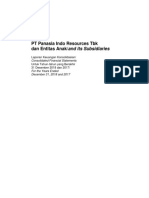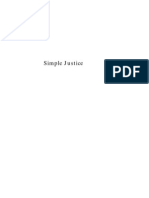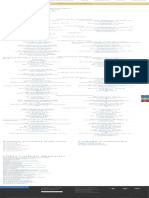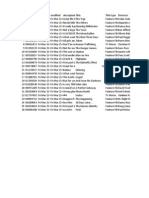The 7 Habits of Highly Effective People
The 7 Habits of Highly Effective People
Uploaded by
Sharmila SubramanianCopyright:
Available Formats
The 7 Habits of Highly Effective People
The 7 Habits of Highly Effective People
Uploaded by
Sharmila SubramanianOriginal Title
Copyright
Available Formats
Share this document
Did you find this document useful?
Is this content inappropriate?
Copyright:
Available Formats
The 7 Habits of Highly Effective People
The 7 Habits of Highly Effective People
Uploaded by
Sharmila SubramanianCopyright:
Available Formats
ASSIGNMENT - I
HUMAN RESOURCE MANAGEMENT
THE 7 HABITS OF HIGHLY EFFECTIVE PEOPLE
Habit 1: Be Proactive:
Being proactive means thinking and acting ahead of anticipated events. Not only is it
a great method for avoiding more work down the road, it can also be extremely important for
averting problems. To be proactive, start taking action, embracing your responsibility, and
controlling your responses. By doing things such as anticipating your future and focusing on
solutions instead of problems, you'll maintain a happier and more proactive outlook.
Proactive is the best approach to life. Proactive Persons have many Good values such as
Balanced Way to Lead Moderation in Life, Strategies and Planning, Give and Take Respect
Policy, SWOT - They are very good at recognizing Strengths, Weaknesses, Opportunities and
Threats. A proactive student takes responsibility for their own learning. The proactive student
have good time management skills, they keep a calendar or a planner, they complete the
reading assignments before attending class, they take notes on the readings so they are
prepared for class discussions, they participate in class by asking and answering questions,
they take a lot of notes in class, they get a copy of a classmate’s notes if they miss class, they
study a little each day, instead of waiting until a few days before the exam and trying to learn
everything at once. Being proactive and setting a positive example can truly help get people
through any situation, including a worldwide pandemic.
Habit 2: Beginning with the end in mind:
This habit is all about knowing your purpose and what you’re trying to achieve.
During this pandemic, beginning with the end in mind helps us think about life down the
road. What happens when the pandemic is over? Was I kind to my neighbours? Did I have
patience with the people I live with? Will our behaviour now affect our relationships later?
What is the goal for when this situation ends? Personally, and professionally, where do I want
to be? During this uncertain time, it’s helpful to have goals to guide us. Answering these
questions is the absolute foundation of ‘beginning with the end in mind’. It’s also about fast-
forwarding into the future and considering what it looks like there for you. People are
typically motivated by the future, not the past and so knowing what you want your future to
be can be a strong source of motivation. Knowing your end goal can give you the continued
motivation you need to achieve success with a clear idea of what the destination is, so that the
steps we take are always in the right direction.
Habit 3: Put First Things First:
Putting first things first means doing the most important things in life. It means being
clear about your priorities and acting on them. Covey describes the importance of keeping
your priority things on the top. During this pandemic we should be thinking, “What’s the
most important thing for me to do today? Am I prioritizing my time to benefit me, my family,
and our health?” By learning to manage our priorities and recognize distractions, Habit 3 will
become the best way to meet our goals. Putting first things first is a really important
component of good personal leadership. Putting first things first is about prioritising
effectively and avoiding time wasting with us doing the tasks we like and know we’re good at
and perhaps neglecting the more urgent/important business needs.
Habit 4: Think win-win:
Win-win’ as a situation in which each party benefits in some way. Covey, in this
habit, explains that for win-win, you not only have to be empathic but also confident enough
otherwise; the win-win situation might not be possible. You can feel the shift in thinking
when ALL OF US can win in any situation. Given the world’s current concerns, how can we
have a win-win attitude? If I just stocked up on hand sanitizers and my sister needs some for
her family, do I say no? Should I perhaps arrange a trade? How can I share and feel like I
didn’t lose in this? How can I take care of myself and my family and still make sure others
have that same security? Developing this habit involves consistently thinking of others;
considering their values and ensuring their thoughts and feelings are at the forefront of your
mind. In doing this, you can ensure that your behaviour is appropriate given the time and
situation and you can work with that person without unhealthy conflict or upset. But it’s not
just about being empathic; it requires confidence, courage and openness as well.
Habit 5: Seek first to understand then to be understood:
Develop empathy and understanding. Seeking to first understand and then be
understood is one of the most powerful tools of effective people. Communicate effectively at
all levels of the organization. Communication is the most important skill in life. According to
Covey, people usually listen with the intent to reply, not to understand, which is an
inappropriate way of communication. Learning to listen and then to clearly communicate
ideas is essential to effective health care. During this time, it is critical that health care
providers and political leaders first listen/understand and then communicate clearly to serve
everyone in the best way possible. He discusses that people spend time reading and writing
but don’t pay attention to listening, which happens to be quite important when it comes to
teamwork. In this habit, he gives the concept of empathic listening because it helps to
understand the viewpoint of others effectively. Effective communication plays a major role in
the success of any organization. People normally spend too much time reading and writing
but don’t give much attention to listening, which is undoubtedly the key factor. The main
philosophy behind the habit 5, seek first to understand then, to be understood of Stephen
Covey revolves around it because it helps the decision-making process.
Habit 6: Synergy.
According to Covey, the best way of finding a solution to the problems is by creating
an environment where everyone can share their ideas with respect to their experience and
expertise so that one best possible solution can be picked out from the pool of ideas. It will be
a far better approach because it helps to produce quality results with a combined effort
instead of an individual giving the solution. Synergy is quite necessary to become a
successful leader because it provides the capability to merge multiple forces like companies,
people, etc. to work collectively by overpowering all the challenges. Synergy is the habit of
creative cooperation. It is teamwork, open-mindedness, and the adventure of finding new
solutions to old problems. But it doesn’t just happen on its own. It’s a process, and through
that process, people bring all their personal experience and expertise to the table. Synergy lets
us discover jointly things we are much less likely to discover by ourselves. Synergy was a
key approach Steve Jobs used to create the Apple empire. Steve was a great leader, but it
does seem Steve Jobs was exceptionally good at identifying greatness in others, connecting
people and inspiring them to find unique – new solutions to challenges. Under his watch there
was rapid product-line evolution and innovation.
Habit 7: Sharpen the Saw:
Sharpen the Saw is a conversation about planning and continuous improvement.
Sharpen the Saw discusses self-renewal, self-care, self-respect and self-improvement.
Sharpen the Saw in areas like: What is changing in my industry? What interests my clients?
How can I improve? How can I help others improve? What interests me?
Sharpen the Saw by focusing on personal well-being. Quiet time, rest, exercise, giving back
to my community, enjoying family / friends, being creative, enjoying art and music are all
activities to make time. In the seventh habit, Covey talks about sharpening the saw because if
you start sawing without it, then you will end up consuming more time and energy for a
particular task. In this habit, Covey emphasizes cultivating the key assets that we have in
ourselves. Abraham Lincoln once said, “Give me six hours to chop down a tree and I will
spend the first four sharpening the axe”. According to Covey, we should renew the four core
dimensions (physical, spiritual, mental, and social) of our lives. By doing this, it becomes
easy for you to increase your growth, handle difficult challenges, and entirely change the life
you used to live before.
You might also like
- MAT 144 All Weeks Discussions and Assignments Full CourseDocument17 pagesMAT 144 All Weeks Discussions and Assignments Full CourseBell100% (1)
- Principles Life and WorkDocument1 pagePrinciples Life and WorkMildred PeñarandaNo ratings yet
- Cairn of The Winter KingDocument32 pagesCairn of The Winter KingKyouko Oshima100% (10)
- 15 Secrets Successful People Know About Time Management Summary - Kevin KruseDocument9 pages15 Secrets Successful People Know About Time Management Summary - Kevin KruseMATTHEW CHRISTIAN SYNo ratings yet
- Jim Rohn LectureDocument2 pagesJim Rohn LectureSanja DžaltoNo ratings yet
- Seven Habits Part 1: Paradigm & PrinciplesDocument9 pagesSeven Habits Part 1: Paradigm & Principlesrapiksaat100% (2)
- Mindsets That Promote Resilience - Carol - Dweck PDFDocument14 pagesMindsets That Promote Resilience - Carol - Dweck PDFKakukk GizellaNo ratings yet
- Seven Habbits of Highly Effective People: Book By: Stephen CoveyDocument13 pagesSeven Habbits of Highly Effective People: Book By: Stephen Coveyjanamshah27No ratings yet
- 7 Habits of Highly Effective PeopleDocument32 pages7 Habits of Highly Effective PeoplePasuruan MusikNo ratings yet
- So Good They Cant Ignore YouDocument6 pagesSo Good They Cant Ignore YouRohitNo ratings yet
- Time To LiveDocument7 pagesTime To LiveclitNo ratings yet
- Stephen Covey's - Seminar Part1Document17 pagesStephen Covey's - Seminar Part1Mathan RajNo ratings yet
- 7 Habits Model ExplainedDocument5 pages7 Habits Model ExplainedGeorgiana EnacheNo ratings yet
- Brian Tracys 10 Steps To Lifetime Success1Document18 pagesBrian Tracys 10 Steps To Lifetime Success1betovegaus100% (2)
- Willpower Doesn't Work (Summary)Document6 pagesWillpower Doesn't Work (Summary)King ThameNo ratings yet
- Time Management 7439 4556Document32 pagesTime Management 7439 4556howieg43100% (2)
- 9 Tactics of Lifelong GeniusDocument4 pages9 Tactics of Lifelong GeniusApurv MehtaNo ratings yet
- SevenMaxims GaryRyanBlairDocument12 pagesSevenMaxims GaryRyanBlairMayur Sonawane100% (2)
- This Free15-Minute Exercise Includes Two Components:: - Five-Page Workbook - 15-Minute Online Audio SeminarDocument6 pagesThis Free15-Minute Exercise Includes Two Components:: - Five-Page Workbook - 15-Minute Online Audio SeminarDayanandNo ratings yet
- Tips For Creating Your First Vision BoardDocument1 pageTips For Creating Your First Vision BoardKizzy FraserNo ratings yet
- Exercising Your InfluenceDocument10 pagesExercising Your Influencesekhar1982No ratings yet
- Summary BooksDocument40 pagesSummary BooksmoizNo ratings yet
- Mindsets Developing TalentDocument4 pagesMindsets Developing Talentapi-294079637100% (1)
- Decision Making LessonDocument3 pagesDecision Making Lessonapi-360465165No ratings yet
- Personal Development QuotesDocument20 pagesPersonal Development Quotesgulzar72No ratings yet
- 7 Habits of Highly Effective People - A Personal View On FacilitationDocument3 pages7 Habits of Highly Effective People - A Personal View On Facilitationradzi zainal100% (1)
- Becoming A Person of InfluenceDocument13 pagesBecoming A Person of InfluenceSudipta BoseNo ratings yet
- The Ultimate Productivity Cheat SheetDocument19 pagesThe Ultimate Productivity Cheat SheetShraman KumarNo ratings yet
- The Monk Who Sold His FerrariDocument5 pagesThe Monk Who Sold His FerrariHimanshi Sahil100% (1)
- GrowthMindset PDFDocument1 pageGrowthMindset PDFmraum7No ratings yet
- Reflection SheetDocument13 pagesReflection SheethfjdprjjhxNo ratings yet
- Basic Leadership ProgramDocument3 pagesBasic Leadership Programapi-242291589No ratings yet
- 4 Q'sDocument10 pages4 Q'sVelpula JyothiNo ratings yet
- A Year of Growing RichDocument5 pagesA Year of Growing Richaldossas100% (2)
- My Morning Routine SummaryDocument4 pagesMy Morning Routine Summaryjohn maleNo ratings yet
- Massive: Action Plan!Document19 pagesMassive: Action Plan!angelsor2280No ratings yet
- Big Ideas From The One ThingDocument8 pagesBig Ideas From The One ThingBody Health ProNo ratings yet
- The Passion Formula PDFDocument18 pagesThe Passion Formula PDFmohitvishal34100% (1)
- Habit 1 From The 7 HabitsDocument78 pagesHabit 1 From The 7 HabitsMuhammad ZawialNo ratings yet
- 7 HabitsDocument9 pages7 HabitsKimberly SorianososNo ratings yet
- Robin Sharma's Tips For Elite BusinessDocument3 pagesRobin Sharma's Tips For Elite BusinessfffffadadNo ratings yet
- The 5 Second Rule Mel Robbins FCDocument4 pagesThe 5 Second Rule Mel Robbins FCindhumathi21496No ratings yet
- Self TalkDocument2 pagesSelf Talkapi-317273644No ratings yet
- Live With PassionDocument19 pagesLive With Passiontrial_stuff100% (1)
- Six Ideas For Becoming A Better ListenerDocument1 pageSix Ideas For Becoming A Better ListenerShahriar KabirNo ratings yet
- What Got You Here Wont Get You There - SummaryDocument4 pagesWhat Got You Here Wont Get You There - SummaryMuhammad Zahid100% (1)
- A Date With DestinyDocument1 pageA Date With DestinyAngelica Magcalas MercadoNo ratings yet
- Eng 1101 End of Semester ReflectionDocument4 pagesEng 1101 End of Semester Reflectionapi-241158398No ratings yet
- Personal Goals & Progress Worksheet PDFDocument7 pagesPersonal Goals & Progress Worksheet PDFFiru LgsNo ratings yet
- 7 Habits of Highly Effective People PDFDocument5 pages7 Habits of Highly Effective People PDFVishal KNo ratings yet
- Building A Productive HabitDocument1 pageBuilding A Productive HabitDaniel MihaiNo ratings yet
- Grow Your Mindset - PEH Questionnaire ScoringDocument2 pagesGrow Your Mindset - PEH Questionnaire ScoringJohn Tomsett100% (1)
- Awaken The Giant WithinDocument13 pagesAwaken The Giant WithinKomal AkramNo ratings yet
- 21 Ways To Double Your ProductivityDocument5 pages21 Ways To Double Your ProductivityzxeroNo ratings yet
- Habits of Effective People 2008Document11 pagesHabits of Effective People 2008jaysonNo ratings yet
- Absolute Yoga: Mastering The Healing Art For Health And TranquilityFrom EverandAbsolute Yoga: Mastering The Healing Art For Health And TranquilityNo ratings yet
- Summary: Goals!: Review and Analysis of Tracy's BookFrom EverandSummary: Goals!: Review and Analysis of Tracy's BookNo ratings yet
- Triumph: The Art Of Overcoming Challenges, To Achieve Your Goals And DreamsFrom EverandTriumph: The Art Of Overcoming Challenges, To Achieve Your Goals And DreamsNo ratings yet
- IT and Bank CompDocument70 pagesIT and Bank CompSharmila SubramanianNo ratings yet
- Faxb Intellectual Property LawDocument3 pagesFaxb Intellectual Property LawSharmila SubramanianNo ratings yet
- Family Law IndexDocument1 pageFamily Law IndexSharmila SubramanianNo ratings yet
- Annual General Meeting (AGM) Under Company Act, 2013 - Taxguru - inDocument4 pagesAnnual General Meeting (AGM) Under Company Act, 2013 - Taxguru - inSharmila SubramanianNo ratings yet
- Annexure 5Document17 pagesAnnexure 5Sharmila SubramanianNo ratings yet
- Pardoning Powers of President of India UPSC NotesDocument2 pagesPardoning Powers of President of India UPSC NotesSharmila SubramanianNo ratings yet
- DR Salim AliDocument5 pagesDR Salim AliSharmila SubramanianNo ratings yet
- Veto Power of President - Indian Polity NotesDocument3 pagesVeto Power of President - Indian Polity NotesSharmila SubramanianNo ratings yet
- Vice President of India Indian Polity NotesDocument3 pagesVice President of India Indian Polity NotesSharmila SubramanianNo ratings yet
- Uganda - MPs Code of Conduct - enDocument2 pagesUganda - MPs Code of Conduct - enSharmila SubramanianNo ratings yet
- 8th Science 3rd Term Book Back Questions With Answers in EnglishDocument24 pages8th Science 3rd Term Book Back Questions With Answers in EnglishSharmila SubramanianNo ratings yet
- Factories Act 1948Document3 pagesFactories Act 1948Sharmila SubramanianNo ratings yet
- Final DraftDocument89 pagesFinal DraftSharmila SubramanianNo ratings yet
- 7th Science 3rd Term Book Back Questions With Answers in EnglishDocument20 pages7th Science 3rd Term Book Back Questions With Answers in EnglishSharmila SubramanianNo ratings yet
- Pradeep - Internship Report Week1Document36 pagesPradeep - Internship Report Week1Sharmila SubramanianNo ratings yet
- Madras Christian College (Autonomous) Department of Social Work (SFS) Research Project PresentationDocument14 pagesMadras Christian College (Autonomous) Department of Social Work (SFS) Research Project PresentationSharmila SubramanianNo ratings yet
- A Study On The Feedback of Parents AboutDocument11 pagesA Study On The Feedback of Parents AboutSharmila SubramanianNo ratings yet
- Pradeep - Internship Report Week IIDocument28 pagesPradeep - Internship Report Week IISharmila SubramanianNo ratings yet
- Assignment I Human Resource Management The 7 Habits of Highly Effective PeopleDocument4 pagesAssignment I Human Resource Management The 7 Habits of Highly Effective PeopleSharmila Subramanian100% (1)
- Inclusive Education in India - Concept, Need and Challenges: January 2016Document12 pagesInclusive Education in India - Concept, Need and Challenges: January 2016Sharmila SubramanianNo ratings yet
- Transitive and IntransitiveDocument3 pagesTransitive and IntransitiveJhermaine Audrey GomezNo ratings yet
- SOGo Native Microsoft Outlook ConfigurationDocument21 pagesSOGo Native Microsoft Outlook ConfigurationpukazhendhiNo ratings yet
- The Legend of Sleepy HollowDocument43 pagesThe Legend of Sleepy HollowDavid BartonNo ratings yet
- RF Series: Low Pressure FiltersDocument10 pagesRF Series: Low Pressure FiltersRestu OktapianaNo ratings yet
- Personality DevelopmentDocument12 pagesPersonality DevelopmentVarsha GowdaNo ratings yet
- EL101 - Module 1Document8 pagesEL101 - Module 1jhna mggy0% (1)
- Negus AnalysisDocument2 pagesNegus AnalysisGarcia Toro AlbertoNo ratings yet
- Skittles ProjectDocument4 pagesSkittles Projectapi-299945887No ratings yet
- Leading Psychiatrist Blows Whistle On ProfessionDocument9 pagesLeading Psychiatrist Blows Whistle On ProfessionpicogyoNo ratings yet
- Ucv Trux Level 6Document11 pagesUcv Trux Level 6Romina Rodrigues LozanoNo ratings yet
- New Members List 2007 As On 31.10Document12 pagesNew Members List 2007 As On 31.10Priya DharshiniNo ratings yet
- Informatica Sequence Generation Techniquesv2Document0 pagesInformatica Sequence Generation Techniquesv2Tata SairameshNo ratings yet
- Tan Vs AdreDocument2 pagesTan Vs AdreLilibeth Dee GabuteroNo ratings yet
- Past Perfect Simple+ Other Tenses MixedDocument14 pagesPast Perfect Simple+ Other Tenses Mixedroxxi89No ratings yet
- Antecedents of Statistics Anxiety Among Senior High School StudentsDocument10 pagesAntecedents of Statistics Anxiety Among Senior High School StudentsPsychology and Education: A Multidisciplinary JournalNo ratings yet
- HDTX - Audit Report 2018 PDFDocument85 pagesHDTX - Audit Report 2018 PDFFajar PambudiNo ratings yet
- A. Count and Write The Number of Objects in Numerals and WordsDocument10 pagesA. Count and Write The Number of Objects in Numerals and Wordse_awinNo ratings yet
- The Plot of The StoryDocument5 pagesThe Plot of The StoryOman AssignmentsNo ratings yet
- 2022 INSET Monitoring and Evaluation ReportDocument2 pages2022 INSET Monitoring and Evaluation ReportGLORY MALIGANGNo ratings yet
- Cases of Personal PronounsDocument2 pagesCases of Personal PronounsAsle Joyce Pameroyan FloresNo ratings yet
- Business Objectives: Multiple-Choice QuestionsDocument2 pagesBusiness Objectives: Multiple-Choice Questionsno dont look at meNo ratings yet
- Simple JusticeDocument131 pagesSimple JusticewillpopeNo ratings yet
- Compliance of A Patrol Unit On The Standard Patrol Policies and Protocols of The Philippine National PoliceDocument24 pagesCompliance of A Patrol Unit On The Standard Patrol Policies and Protocols of The Philippine National PoliceJubilee PadieraNo ratings yet
- University of LuzonDocument21 pagesUniversity of LuzonHawn Luc FernandezNo ratings yet
- Ministries & Offices Archdiocese of Mobile Mobile, ALDocument1 pageMinistries & Offices Archdiocese of Mobile Mobile, ALjsmoore588No ratings yet
- Marketing Communications - Module 4 NotesDocument8 pagesMarketing Communications - Module 4 NotesadamNo ratings yet
- LUMILAN, Deseree BSN 1-Y1-2 (Course Task Cu13) PDFDocument2 pagesLUMILAN, Deseree BSN 1-Y1-2 (Course Task Cu13) PDFDeseree C. Lumilan100% (1)
- RizalDocument7 pagesRizalANA FRANCESCA R. CAGURANGANNo ratings yet
- NON Boring Movies. Great Movies...Document6 pagesNON Boring Movies. Great Movies...chasm9aNo ratings yet





